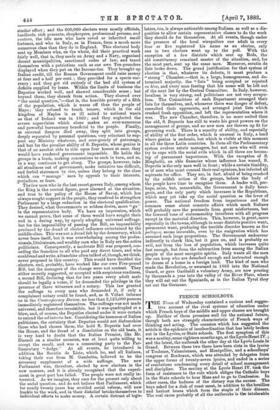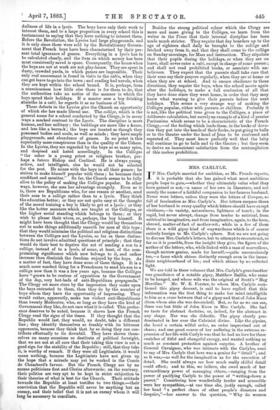FRENCH SCHOOLBOYS.
THE Times of Wednesday contained a curious and sugges- tive account of the rival systems of education under which French boys of the middle and upper classes are brought up. Neither of them promises well for the national future, though both are strangely characteristic of French ways of thinking and acting. The occasion which has suggested the article is the epidemic of insubordination that has lately broken out in the Lycees, or State schools. The first symptom of this was a mutiny, some eighteen months ago, at the Lycee Henri IV. ; and the latest, the outbreak the other day at the Lyvie Lonis•le Grand. Between these two there have been riots in the lycees of Toulouse, Valenciennes, and Montpellier, and a schoolboys' congress at Bordeaux, which was attended by delegates from the upper forms of twenty-seven lycees, and ended in a series of resolutions condemning every detail of school management and discipline. The mutiny at the Lycee Henri IV. took the form of resistance to the rule which obliges the Catholic boys in the State schools to hear Mass and to go to Confession. In other cases, the badness of the dietary was the excuse. The boys asked for a dish of roast meat, in addition to the bouillon and haricot beans which form the staple of their dinners. dullness of life in a lycee. The boys have only their work to interest them, and to a large proportion in every school this is tantamount to saying that they have nothing to interest them. Before the Revolution, the Lycees had large playgrounds, and it is only since these were sold by the Revolutionary Govern- ment that French boys have been characterised by their pre- sent total ignorance of games. Everything in a lycee has to be calculated closely, and the item on which money has been most consistently saved is space. Consequently, the hours when the boys are not at work are not play-hours. They are spent in dusty, crowded yards, in which games are impossible. Their only real amusement is found in visits to the cafes, when they can get leave to go into the town ; and reading bad novels, when they are kept within the school bound. It is, perhaps, from a consciousness how little else there is for them to do, that the authorities take no notice of the manner in which the boys spend their holidays. If a master sees a boy drinking absinthe in a cafe, he regards it as no business of his. These defects in the Lycees give the Church an opportunity of which she has made liberal use. The collage, which is the general name for a school conducted by the Clergy, is in many ways a marked contrast to the Lycee. The discipline is more human, and less military ; the buildings are more like a home, and less like a barrack ; the boys are treated as though they possessed bodies and souls, as well as minds ; they have ample playgrounds, and abundance of games. In no point is this superiority more conspicuous than in the quality of the Ushers. In the Lycees, they are regarded by the boys as so many spies, and despised and hated accordingly. In the Colleges " the usher is a young priest or religious brother, per- haps a future Bishop and Cardinal. He is always young, active, and intelligent, else he would not be selected for the post. He mixes with the boys in all their games ; he strives to make himself popular with them ; he becomes their confidant and monitor." So far, the Church seems to be fully alive to the policy of making the Colleges popular. In other ways, however, she uses her advantage strangely. Even as it is, there are Republicans who, for one reason or another, send their sons to a college rather than to a lycee. They think the education better; or they are not quite easy at the thought of the moral training a boy is likely to get at a lycee ; or they like the batter manners which are taught at the Colleges, or the higher social standing which belongs to them ; or they wish to please their wives, or, perhaps, the boy himself. It might have been thought that the Clergy would lay themselves out to make things additionally smooth for men of this type ; that they would minimise the political and religious distinctions between the Colleges and the Lycees, so far as these distinc- tions do not involve admitted questions of principle ; that they would do their best to deprive the act of sending a son to a college, instead of to a lycee, of some, at least, of the com- promising significance which now belongs to it, and rather increase than diminish the freedom enjoyed by the boys. As a matter of fact, they have done none of these things. It is a much more marked thing for a Frenchman to send his son to a college now than it was a few years ago, because the Colleges have "grown to be centres of opposition to the Government of the day, very hot-beds of anti-Republican propaganda." The Clergy set more store by the impression they make upon the boys entrusted to them, than they do by the number of boys whom they have the opportunity of impressing. They would rather, apparently, make ten violent anti-Republicans than twenty Moderates, who, so long as they have the kind of Government they like, do not care what it is called. This prefer- ence deserves to be noted, because it shows how the French Clergy read the signs of the times. If they thought that the Republic would last, they would, no doubt, take a different line ; they identify themselves so frankly with its bitterest opponents, because they think that by so doing they can con- tribute effectually to its downfall. They have shown them- selves on many occasions so destitute of political foresight, that we are not at all sure that their taking this view is not a good sign for the stability of the Republic ; still, that they take it, is worthy of remark. If they were all Legitimists, it would mean nothing, because the Legitimists have not given up the hope that a miracle may yet be worked in the Comte de Chambord's favour. But the French Clergy are by no means politicians first and Clerics afterwards; on the contrary, their politics are very apt to be kept in strict subjection to their theories of what is best for the Church. Their attitude towards the Republic at least testifies to two things,—their conviction that the Republic will never be anything but an enemy, and their belief that it-is not an enemy whom it will long be necessary to conciliate. Besides the strong political colour which the Clergy are more and more giving to the Colleges, we learn from the writer in the Times that their internal discipline has been made much stricter. They require that day boarders up to the age of eighteen shall daily be brought to the college and fetched away from it, and that they shall come to the college on Sunday mornings, for Mass and instruction. They stipulate that their pupils during the holidays, or when they are on leave, shall never enter a cafe, except in charge of some person ; and shall not read prohibited books, or associate with un- believers. They expect that the parents shall take care that their sons say their prayers regularly, when they are at home or when they are at 'school. And to ensure obedience to these directions, they require the boys, when the school meets again after the holidays, to make a full confession of all that they have done since they went home, in order that they may know what warning to give their parents before the next holidays. This seems a very strange way of making the Colleges popular, either with parents or children. Probably it is not, like the political tone given to the Colleges, a piece of, deliberate calculation, but merely an example of a kind of precise Puritanism which seems to be a characteristic of the French Clergy,—of the feeling which leads them, in the books of devo- tion they put into the hands of their flocks, to put going to balls- or to the theatre under the head of [sins to be confessed and• repented of. They must know perfectly well that the laity will continue to go to balls and to the theatre ; but they seem to derive an inconsistent satisfaction from the contemplation of this useless prohibition.



































 Previous page
Previous page